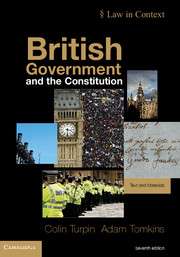7 - The powers of government
from Part II - Government
Summary
No one in the modern state is untouched by the power of government. The editors of a recent volume of essays on executive power write in their introduction that:
at the opening of the twenty-first century, governments have become the most powerful organs of nation states. They determine the direction, if not always the detail, of domestic policy. They decide how public money should, and should not, be spent. Foreign policy is made almost entirely by governments. And control of military power is likewise the preserve of the executive. Whatever the truth of the claim that, in this era of apparent globalization, states are no longer the only or even the most powerful units of political power, within nation states governments still retain very considerable power. This is not to say that their power can never be checked. Governments may rule, but they do not always rule supreme. In democracies the personnel of the executive is subject to the verdict of the electorate; the policies of the executive may be subject to political or parliamentary accountability; and the legality of executive action may be reviewed by the courts of law.
(P Craig and A Tomkins (eds), The Executive and Public Law: Power and Accountability in Comparative Perspective (2006), p 1.)
In this chapter we are concerned with the power and, more particularly, with the powers (plural) of British government. A considerable proportion of the chapter is devoted to exploring the law- and rule-making powers of government. As such, it should be read alongside what is said about delegated legislation in chapters 2 (pp 127–30) and 3 (pp 168–72), and what is said about parliamentary oversight and legislative procedure in chapter 9.
- Type
- Chapter
- Information
- British Government and the ConstitutionText and Materials, pp. 450 - 514Publisher: Cambridge University PressPrint publication year: 2011



